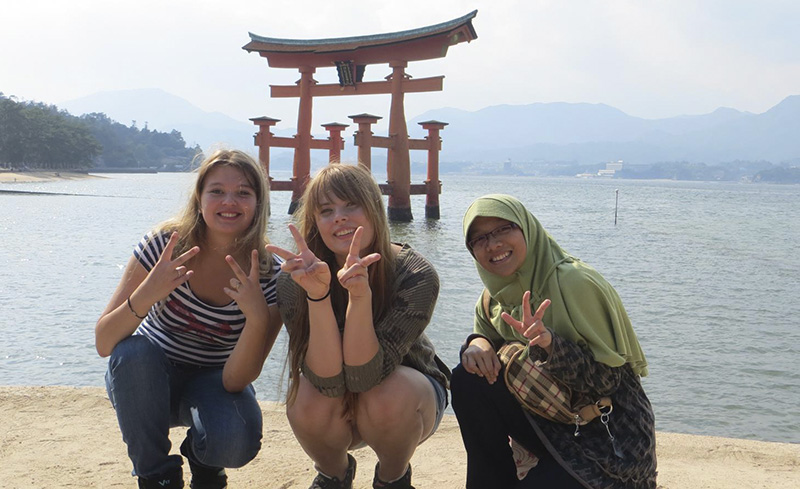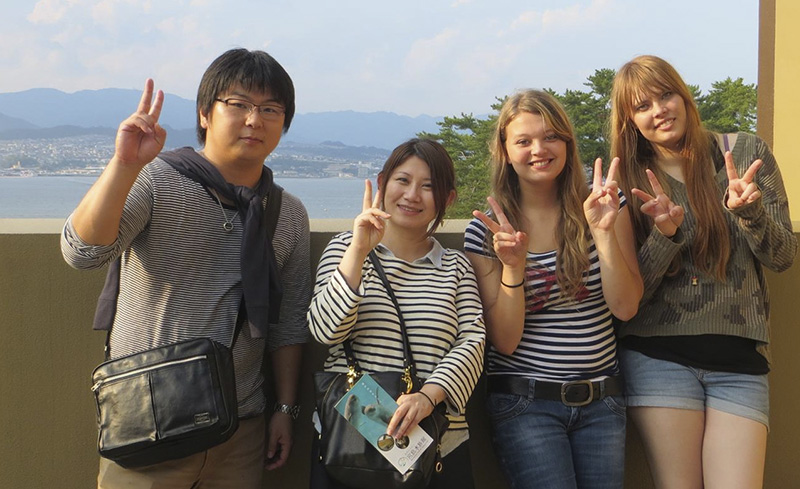Study Abroad in Japan
Explore a new culture, learn a new language & broaden your horizons by enrolling in a program to study in Japan with YFU. Discover our programs today.
“My exchange to Japan allowed me to look through the eyes of a culture very far from the one I knew. I'm still in contact with many of the friends I made and have made plans to visit a few of them in the future. My exchange abroad continues to influence my decisions in life”
-James
+ More About Japan
Konnichiwa! If you’re looking for a fascinating culture with a rich history, beautiful scenery, and welcoming families and friends, then Japan may be just the place for you!
Come to the birthplace of manga, anime, origami, kimonos, and samurai, where you can learn firsthand about all these popular fixtures of Japanese culture which mesh Japan's history with its present-day influences. You will have the chance to attend performances of traditional theatre, or enjoy a night of modern day karaoke. The Japanese enjoy newer sports like snowboarding and baseball, as well as traditional sports like sumo wrestling and kendo (fencing).
One major element in the Japanese experience is school, where you will take classes with Japanese students in various subjects and participate in extracurricular activities like martial arts. Food in Japan will offer a variety of new dishes ranging from sushi, rice bowls, and different types of noodles, to dishes like chashu and moyashi.
In Japan, you will find a truly unique culture of ancient history with a modern twist. By going on a YFU program to Japan, your experience will open up endless opportunities for your future!
+ Scholarships Available
YFU USA is proud to send over 200 American students on cultural exchange with a full or partial scholarship each year. Financial assistance may be in the form of a merit-based scholarship, needs-based financial aid, or Legacy Grant for students who are previously involved in the YFU Community. Scholarships may vary in deadline, requirements, and eligibility. To learn more, please visit our Scholarships Page to find details on the following scholarships eligible for Japan:
Holcomb & Farnell Foreign Study Fund
YFU Legacy Grant
YFU Financial Aid Fund
WEH Foundation Scholarship
Japan-America Friendship Scholars (JAFS)
Kikkoman National Scholarship
Kikkoman/FCCLA Scholarship
The Alan Hershey Legacy Scholarship for Japan Exchange
Japan Business Society of Detroit (JBSD) Foundation
Kikkoman/Folsom, CA
Kikkoman/Walworth County, WI
Chevron Culture and Travel Program
Epson America, Inc. International Scholarship
Mazda Canada Inc.
Mitsubishi Electric US, Inc.
Sony Corporation of America Scholarship Program
Karla Topolka Scholarship Fund
Passport to Equity
+ Application Deadline
Applications must be submitted by September 15 for Winter/Spring departure programs and February 15 for Summer and Fall. Programs often fill before these deadlines, so we encourage early submission!
**Please note that all 2024 Year and Semester Japan programs are FULL.
+ Additional Information
Visa Information
Information regarding visas and other immigration processes will be provided upon enrollment.
Additional Costs
Students are responsible for paying any school fees (including books, transportation, and optional school trips), as well as all fees related to obtaining visas. Program tuition does not include personal spending money. ** YFU Japan requires students to be vaccinated against Covid-19**
Important Information
Due to cultural differences, local customs, and school regulations, students with strict dietary requirements, students with alternative schooling such as homeschooling, and students who require certain medications (notably those used to treat ADD/ADHD) have not been successfully placed in Japanese schools. Please check the Japanese Embassy website for more information regarding this topic. Smoking in Japan is illegal for those under the age of 20. Violating this, or any Japan law, may be terms for immediate dismissal from the program.
Due to the Japanese school system, YFU Japan is unable to accept students who have graduated, even if they are within the age range of the program.
Please note that YFU Japan requires that students participating in their programs are fully immunized against COVID-19.
Students to Japan may be placed with a host family anywhere in the country, including the Okinawa Islands, in either a rural or suburban setting. Students are normally not placed in large urban centers, but often are placed in small towns, where they have an opportunity to become an integral part of their host communities!
Choose Your Program
+ Academic Year Program
School
Students will typically be placed in the first or second year at a Japanese high school. Most schools are quite large, averaging 500 to 1,000 students. You will likely study subjects like Japanese classics or contemporary Japanese language and you may also attend elective classes that include subjects such as art and calligraphy. You can choose to attend club activities after school such as karate or judo.
Japanese schools are generally conservative and therefore the dress code in Japan may be stricter than you are used to. In Japanese schools, students do not have unnaturally dyed hair or eccentric hair styles. Piercings, earrings, necklaces and rings are not allowed in schools. Students cannot wear makeup, perfume, or have visible tattoos. Female students cannot wear skirts above the knees or high heels. Male students should not have a beard or long hair. Schools in Japan almost always require uniforms. The cost of a school uniform and language training is included in the program tuition. All students will be placed in the appropriate language course by result of a level check test at the arrival orientation.
Please note: Students may not be able to receive a transcript or a record of grades. Some schools are able to issue a certificate of attendance. Placement in a particular grade level, credit, or graduation cannot be guaranteed.
Orientations
All students applying for the year program must be available for a mandatory 3-day National Pre-Departure Orientation*, which usually takes place in early-mid December. This orientation is a required part of the program aimed at preparing students for their experience overseas.
*Due to COVID-19, the 3-day National Pre-Departure Orientation described above may take place on-line dependent upon recommended guidelines at the time of the event. YFU will continue to assess the situation as it develops.
Upon arrival in Japan, students will partcipate in a 5-day orientation in Tokyo. All orientation costs are included in program tuition.
Age Requirement
- 2025 Spring Departure: Students born April 2, 2007 - March 31, 2010.
- Students applying for the year program who will graduate from high school before the start of their program will not be considered for admission.
| PROGRAM | DEPARTURE | RETURN | FULL TUITION |
|---|---|---|---|
| 2025 Spring Year | Late March | Early January | $17,095 |
Tuition Includes
- Placement with a carefully selected host family
- Enrollment in a local Japanese high school
- Airport transfers
- Domestic and international travel
- All pre-departure and post arrival orientations
- Pre-program support by trained YFU staff
- Support from a YFU Japan Area Representative while on program
- Comprehensive insurance
Language
Japanese. One year of previous language study is required for long-term Japan programs. A Japanese correspondence course is included in program tuition for long-term program participants.
Host Family Placement
Students to Japan may be placed with a host family anywhere in the country, including the Okinawa Islands, in either a rural or suburban setting. Students are usually not placed in large urban centers.
+ Semester Programs
School
Students will typically be placed in the first or second year at a Japanese high school. Most schools are quite large, averaging 500 to 1,000 students. You will likely study subjects like Japanese classics or contemporary Japanese language and you may also attend elective classes that include subjects such as art and calligraphy. You can choose to attend club activities after school such as karate or judo.
Japanese schools are generally conservative and therefore the dress code in Japan may be stricter than you are used to. In Japanese schools, students do not have unnaturally dyed hair or eccentric hair styles. Piercings, earrings, necklaces and rings are not allowed in schools. Students cannot wear makeup, perfume, or have visible tattoos. Female students cannot wear skirts above the knees or high heels. Male students should not have a beard or long hair. Schools in Japan almost always require uniforms. The cost of a school uniform and language training is included in the program tuition. All students will be placed in the appropriate language course by result of a level check test at the arrival orientation.
Please note: Students may not be able to receive a transcript or a record of grades. Some schools are able to issue a certificate of attendance. Placement in a particular grade level, credit, or graduation cannot be guaranteed.
Orientations
All students applying for the semester must be available for a mandatory 3-day National Pre-Departure Orientation*, which usually takes place in mid-July or early-mid December (for Spring programs). This orientation is a required part of the program aimed at preparing students for their experience overseas. All students will participate in a one-day local pre-departure orientation in May/June for fall departures.
Upon arrival in Japan, students will partcipate in a 5-day orientation in Tokyo. All orientation costs are included in program tuition.
Age Requirement
- 2024 Fall Departure: Students born April 2, 2006 - March 31, 2009.
- 2025 Spring Departure: Students born April 2, 2007 - March 31, 2010.
- Students applying for the semester program who will graduate from high school before the start of their program will not be considered for admission.
Language
Japanese. One year of previous language study is required for Japan long-term programs. A Japanese correspondence course is included in program tuition for long-term program participants.
| PROGRAM | DEPARTURE | RETURN | FULL TUITION |
|---|---|---|---|
| 2024 Fall Semester | Mid August | Early January | Program is Full |
| 2025 Spring Semester | Late March | Early August | $15,095 |
Tuition Includes
- Placement with a carefully selected host family
- Enrollment in a local Japanese high school
- Airport transfers
- Domestic and international travel
- All pre-departure and post arrival orientations
- Pre-program support by trained YFU staff
- Support from a YFU Japan Area Representative while on program
- Comprehensive insurance
Host Family Placement
Students to Japan may be placed with a host family anywhere in the country, including the Okinawa Islands, in either a rural or suburban setting. Students are usually not placed in large urban centers.
+ Summer Program
Discover Japan
Japan comes to life when you arrive for your six-week stay with your host family. Attending traditional tea ceremonies, practicing martial arts, and visiting local summer festivals are just some of the activities that YFU students to Japan may experience during their exchange. School is in session during our summer program in Japan, so students may attend classes at their host high schools, typically for up to one week. Students have the opportunity to attend and audit classes but are not officially enrolled in the school during their stay in Japan, so students will not receive report cards or evaluations of their performance.
Orientation
All students applying for the summer program must be available for a mandatory 3-day Japan Pre-Departure Orientation*, which takes place immediately prior to the departure date. This orientation is specifically designed for American students studying in Japan and covers cultural elements such as food, language, etiquette, and arts. It is a required part of the program aimed at preparing students for experience overseas.
*Due to COVID-19, the 3-day National Pre-Departure Orientation described above may take place on-line dependent upon recommended guidelines at the time of the event. YFU will continue to assess the situation as it develops.
Age Requirement
- 2024 Summer Departure: Students born April 2, 2006 - March 31, 2009.
Students should not be graduated before the start the summer program.
Language
Japanese. Previous language study is not required.
| PROGRAM | DEPARTURE | RETURN | FULL TUITION |
|---|---|---|---|
| 2024 Summer | Late June | Early August | $9,995 |
Tuition Includes
- Placement with a carefully selected host family
- Enrollment in a local Japanese high school, typically for up to one week.
- Airport transfers
- Domestic and international travel
- All pre-departure and post arrival orientations
- Pre-program support by trained YFU staff
- Support from a YFU Japan Area Representative while on program
- Comprehensive insurance
Host Family Placement
Students to Japan may be placed with a host family anywhere in the country, including the Okinawa Islands, in either a rural or suburban setting. Students are usually not placed in large urban centers.




